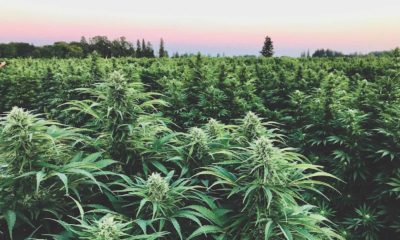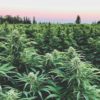Wildwood Flower Farm’s Sustainable High
The husband-and-wife team at this Washington cannabis farm turns work into a labor of love.
Approximately four hours and twenty minutes northeast of Seattle in Washington’s Okanogan County, Melissa Beseda reflects on the successful conclusion of another cannabis cultivation season. After months of hard work as the plants grew and matured, she and Isaac Ekholm, her partner in life and business, have completed the harvest on the Wildwood Flower Farm and are now preparing for the impending arrival of their first child.
Ekholm began growing cannabis for his father who uses it medically to treat symptoms of multiple sclerosis. His labor of love quickly became a passion for cultivating top-quality cannabis. After the passage of Washington’s recreational cannabis legislation in 2012, Ekholm applied for a license as a cannabis producer and processor and founded Wildwood Flower Farm in 2016.
After witnessing how cannabis could positively impact people’s lives, Beseda joined him on the farm the following year. Together, they’ve been sustainably growing cannabis on a 30,000-square-foot plot of land ever since, with a crew of lovable and loyal animals to share in the work.

But since the coronavirus pandemic, the couple brought in two cannabis harvests without outside help, sharing the propagating, tending and harvesting duties throughout the season. Beseda says that she and Ekholm work well together and their interests and abilities complement each other nicely, all to the benefit of the operation. “His vision for the farm and ability to foresee opportunities and threats to the business have given this bootstrapped farm a competitive advantage,” she says. “His ability to focus on the overall strategy of the growing season while managing the intricacies and demands of the day-to-day operations is what has made us successful. He’s what keeps us on the rails.”
Beseda serves as the nurturer and sometimes taskmaster, working hard to care for everyone on the farm (including the animals), “while at the same time whipping them all into shape and ensuring it all runs smoothly,” she says.
The furry and feathered members of the family have their own duties on the farm. A flock of chickens and turkeys keeps the perimeter of the growing area free of bugs and weeds, and the ornery tom turkey keeps a watchful eye behind the garden, serving as the designated security guard. The farm’s two cats, Peggy and Squeakers, are pest management masters, protecting the cannabis plants from attack by voles and gophers.
“Since we had them, we haven’t lost one plant to rodents,” Beseda says, adding that even the herd of eight goats plays an important role on the sustainable farm when they’re moved to the growing area after harvest time to help prepare the land for the next season. “Goats are great for soil regeneration. Their hoofs aerate the soil, their foraging keeps the weeds under control and their manure goes into our compost, which will enrich the soil for years to come.”

Working together, the team of humans and animals keeps busy through the growing season, tending the plants and nurturing them to harvest. In 2021, the couple cultivated several strains of cannabis including Jungle Cake, Sunshine Queen, Magenta Hash Plant and a South African landrace sativa that’s also serving as parent stock for breeding experiments on the farm. After harvest, they trim and bag the best cannabis flower to be sold under the Wildwood Flower Farm label, with the rest of the crop going to wholesalers and manufacturers to be packaged as flower or processed into oil.
Ekholm and Beseda say they have embraced sustainable and regenerative farming values, using only OMRI-rated pesticides that are gentle on the environment. They’re also enthusiastic for integrated pest management practices including the use of beneficial insects and predatory mites and are careful to enrich their farmland with compost and other natural amendments.
“We invest in the long-term health of the soil and our environment,” Beseda says. “We try to close the loop as much as we can with our inputs: All of our plant waste is composted and will amend the soil for the next crop. Every year the soil seems to get better and better.”
Taken together, these sustainable practices give the cannabis plants at Wildwood Flower Farm a nurturing home to grow and ripen. The extreme northern latitude—only about 50 miles from the Canadian border—means the growing season is compacted compared to other cannabis growing regions, but the long days during the growing season provide ideal conditions to fuel vegetative growth.

“While we tend to have a short season up here in North Central Washington, our long summer days are hot, dry, and clear—the perfect environment for growing cannabis outdoors and in greenhouses,” he says. Ekholm and Beseda say they use these methods in concert with light deprivation techniques to ensure long-flowering cultivars finish in time. It’s difficult and time-consuming work, but it’s all part of the farm’s mission to “grow and share high quality, sustainably-grown flower with a commitment to our community, our future employees and the environment,” Beseda says.
Although cannabis is the primary commercial driver for the operation, Wildwood Flower Farm also grows other crops including alfalfa, elderberries, peppers and a few stone fruits. While growing these plants is largely in the experimental phase and the results are generally used for the farm or in their on-site home, Beseda says that they’re exploring ways to tap into a distribution chain that will allow them to make their other crops profitable, too.
“We love growing most types of plants and raising most types of animals,” Beseda says. “Seeing how things all come together on a small farm like ours has been very rewarding and always interesting. There’s a constant desire to see what inputs we can provide on our own and to find varieties of plants that thrive in the environment we live in.”
That environment, it seems, is also perfect for nurturing the family that serves as stewards of the land. Looking back at the past year, Beseda says her pregnancy and her baby developed in concert with the crops on the farm.

“My first trimester lined up with the bulk of our planning and prepping for the season,” she says. “The baby’s rapid growth in the second trimester coincided with the plants’ most rapid growth during the height of the summer, and the return of my energy helped us power through the light deprivation part of our season. The plants began slowing down and ripening up, just as I began slowing down during the third trimester and the baby began ripening up.”
This story was originally published in the print edition of Cannabis Now.


























